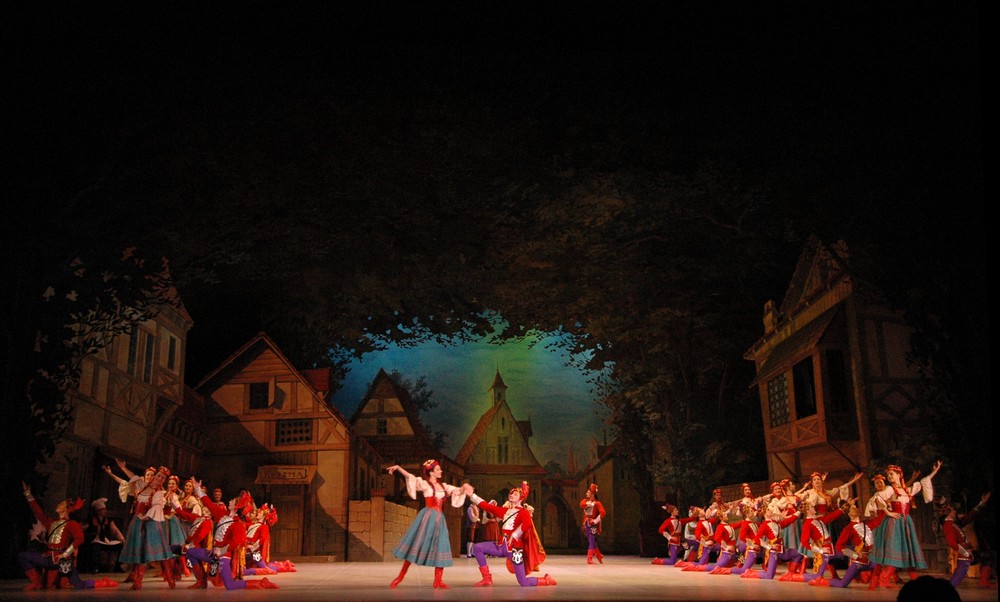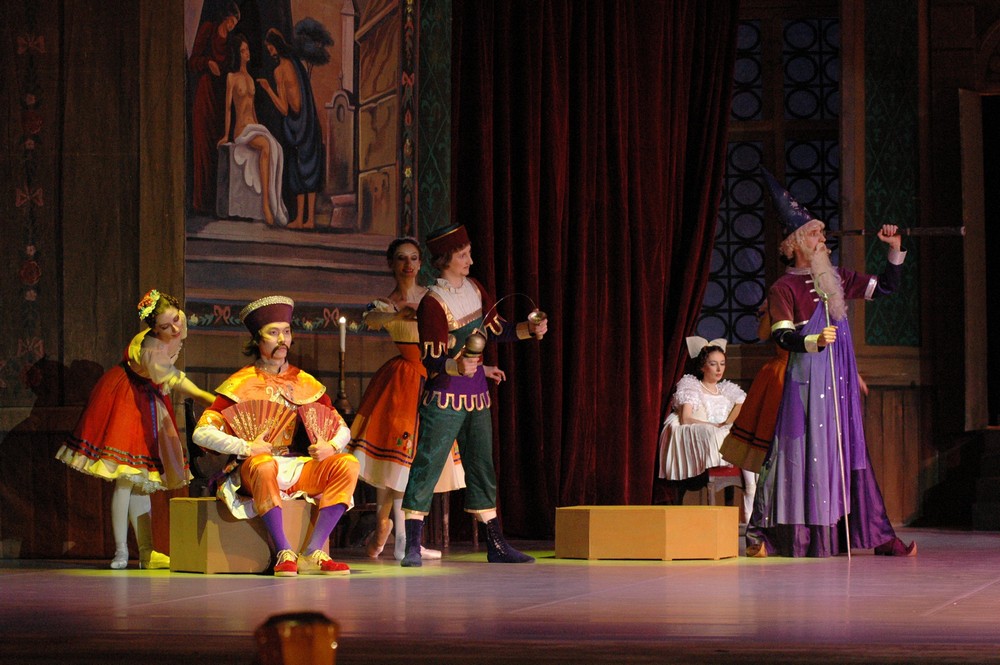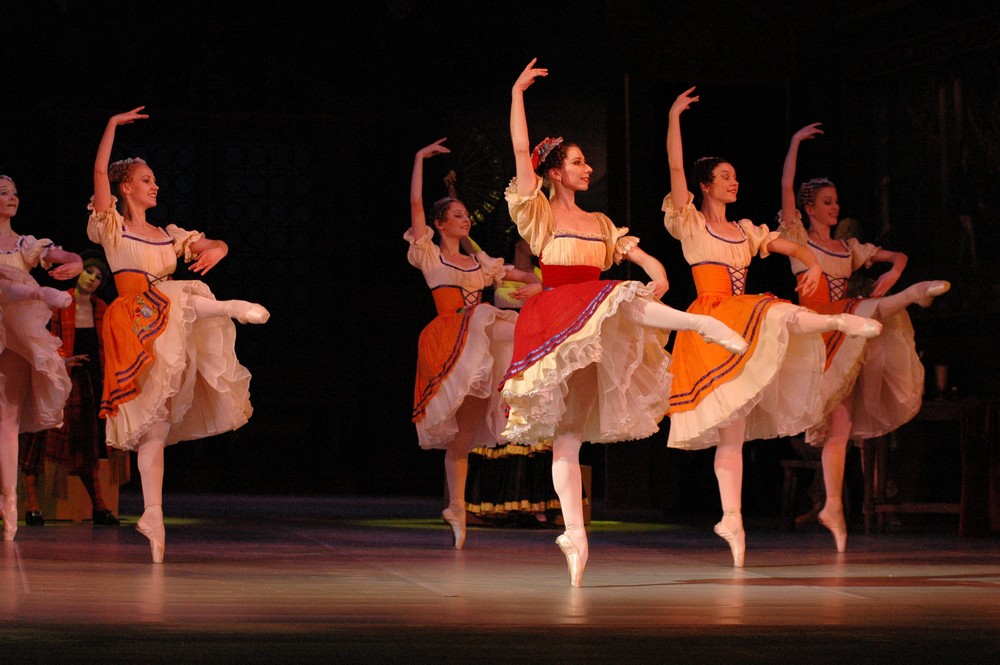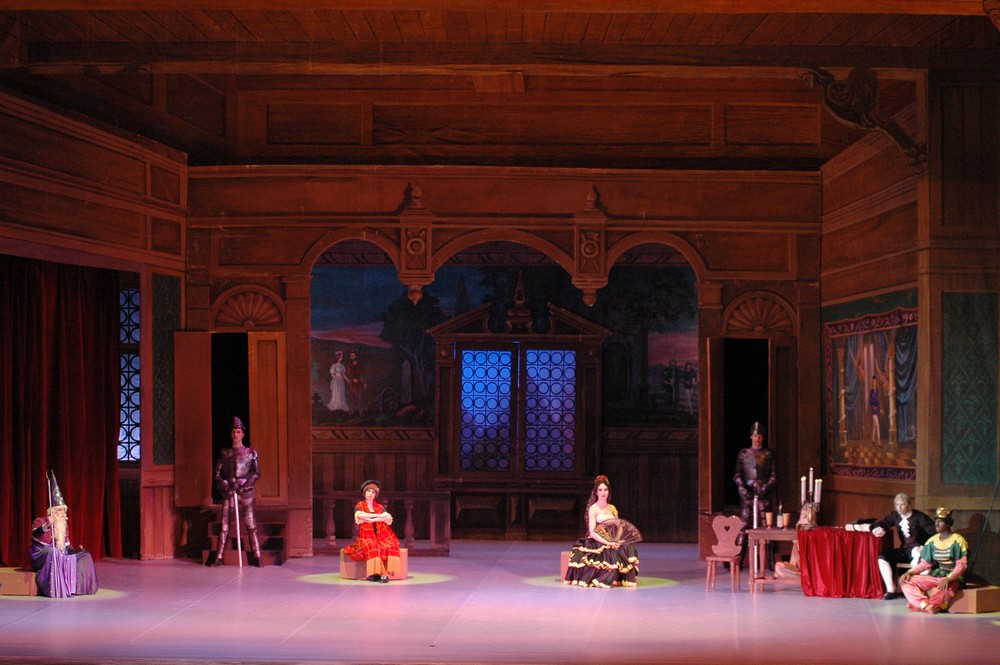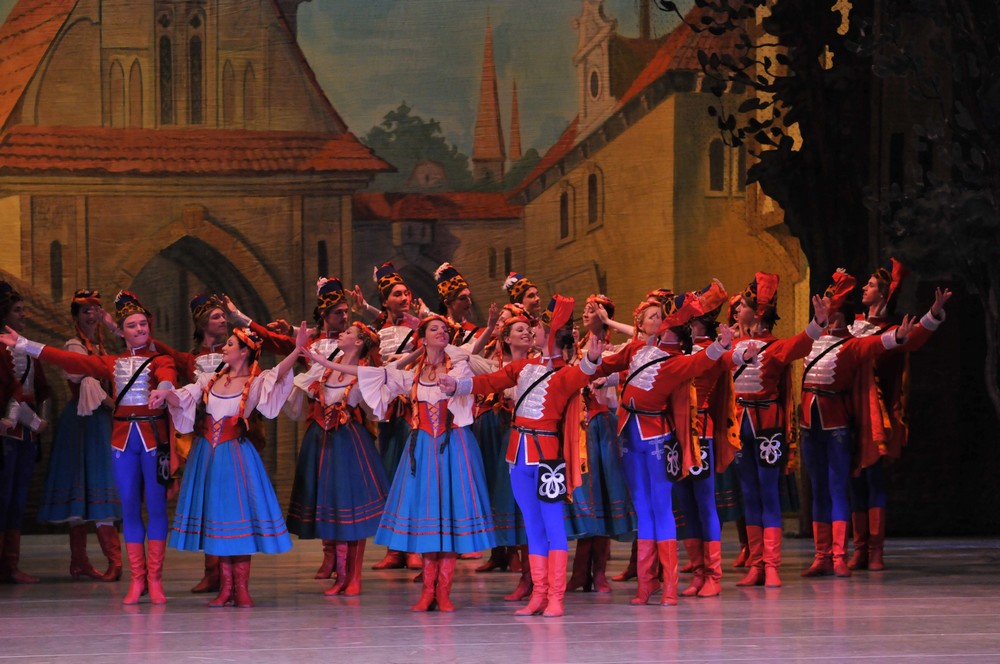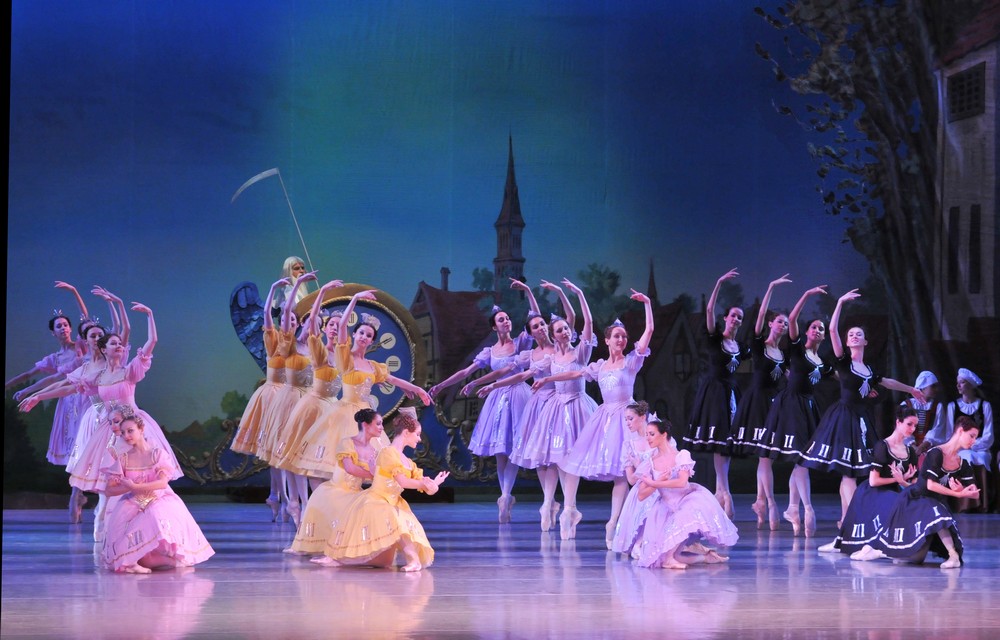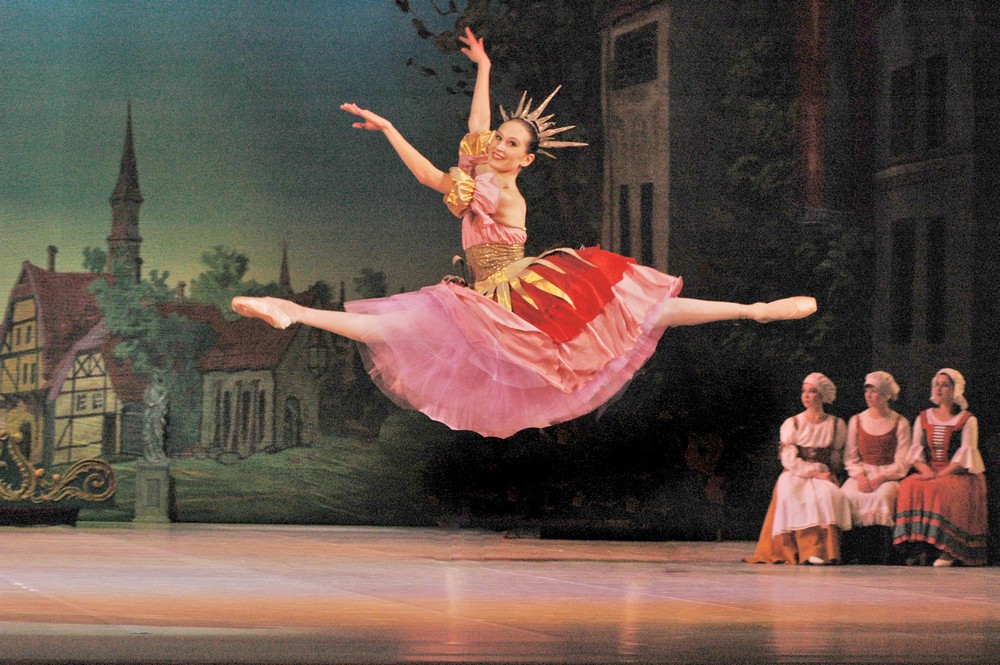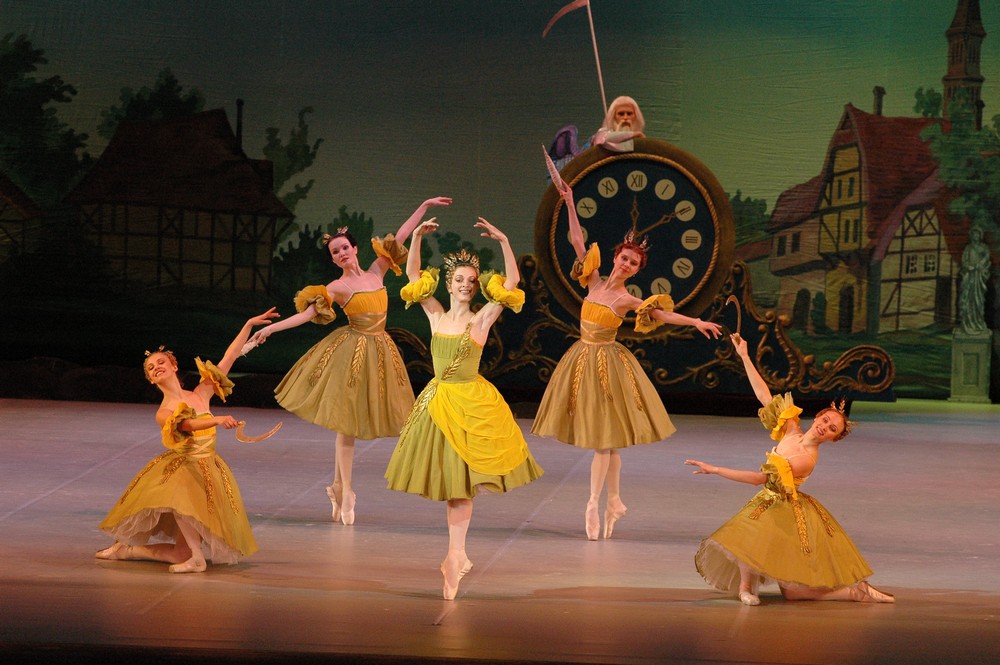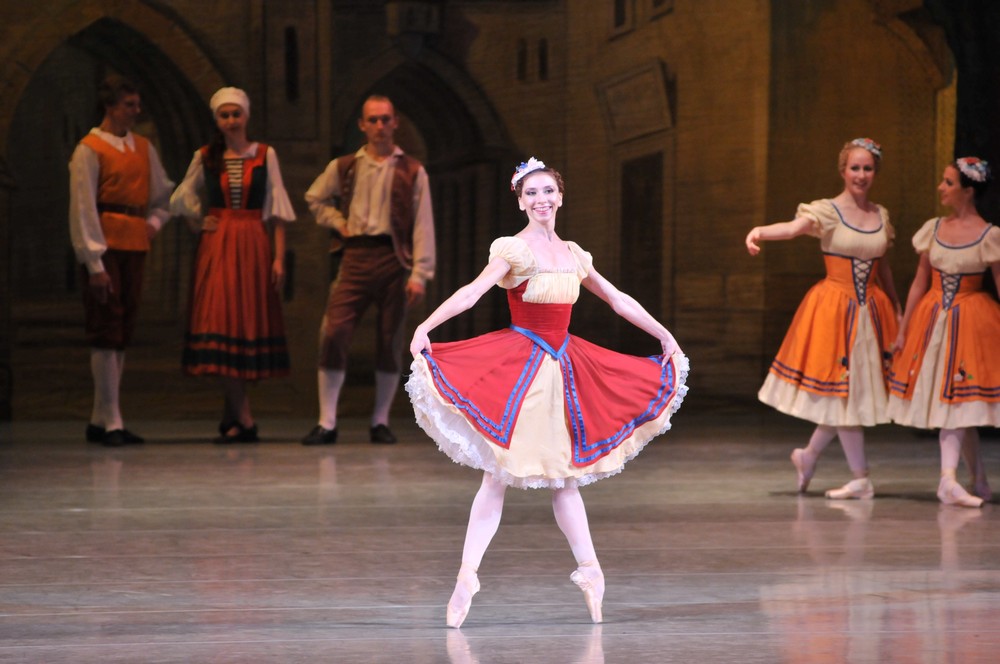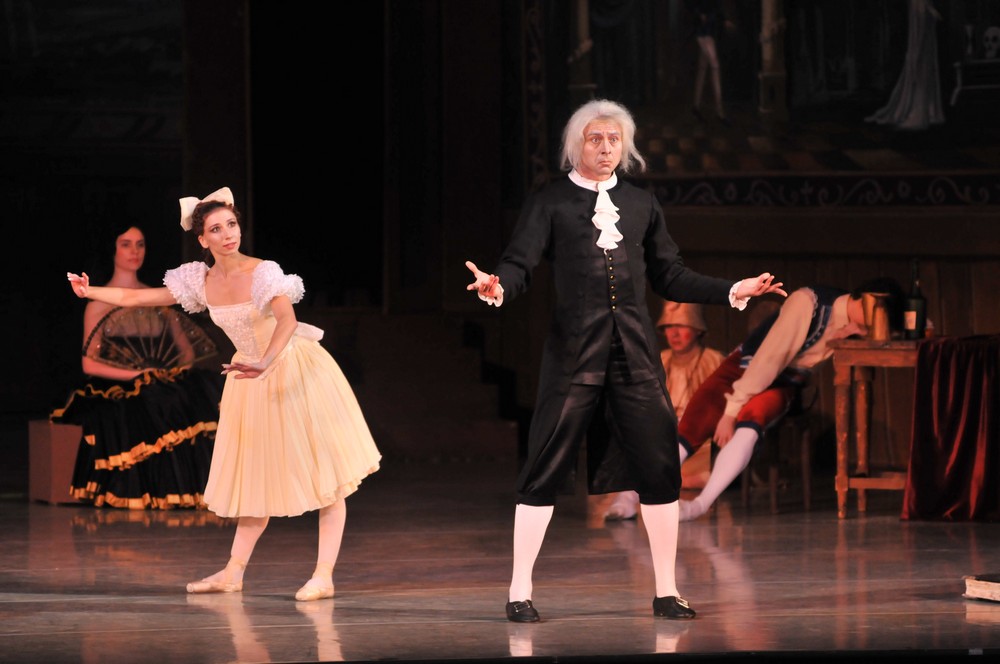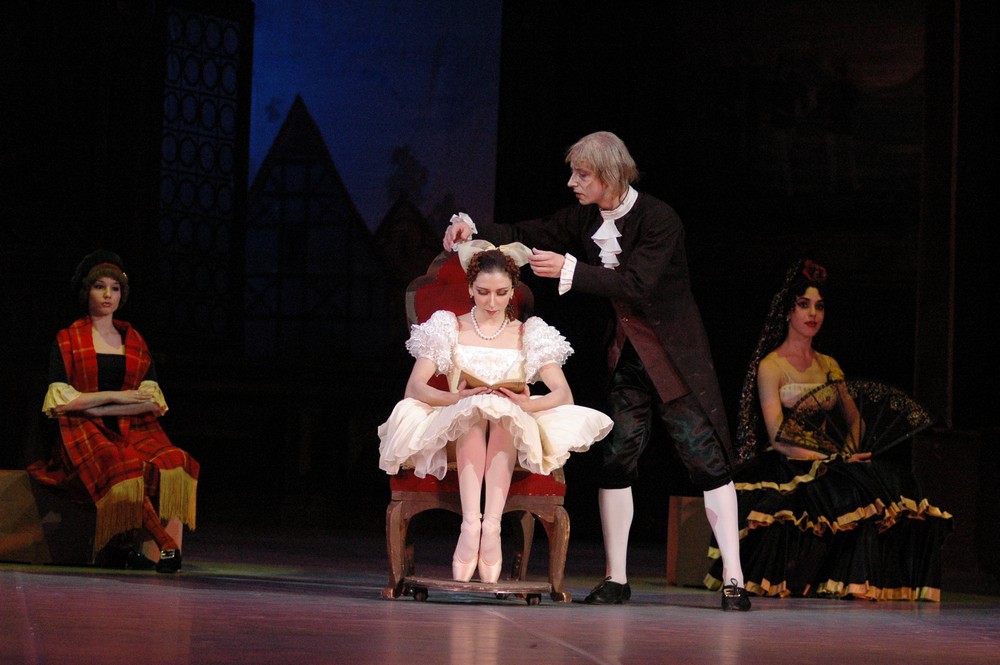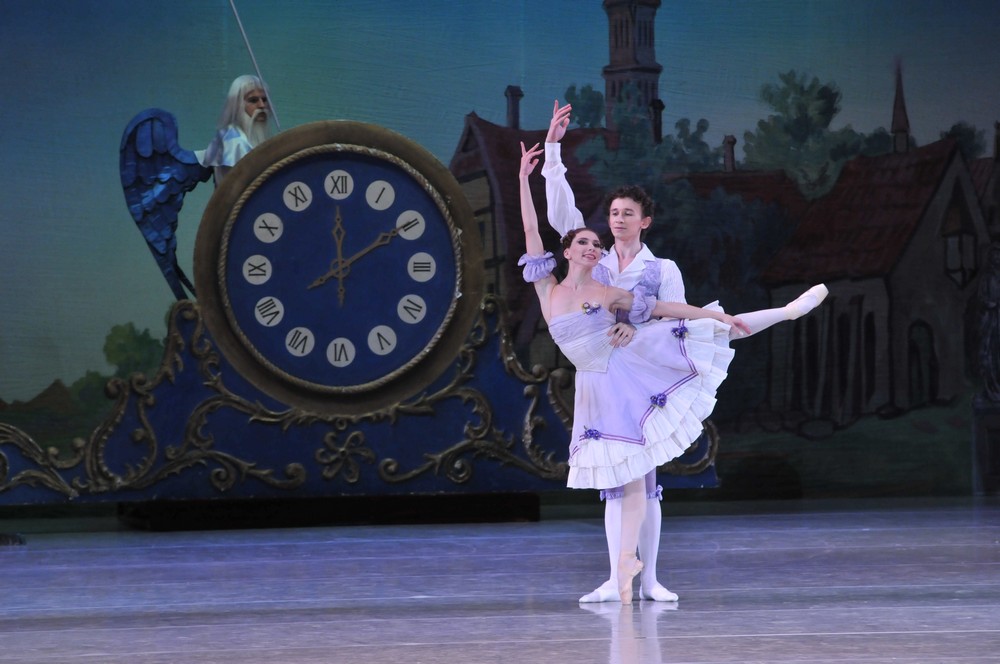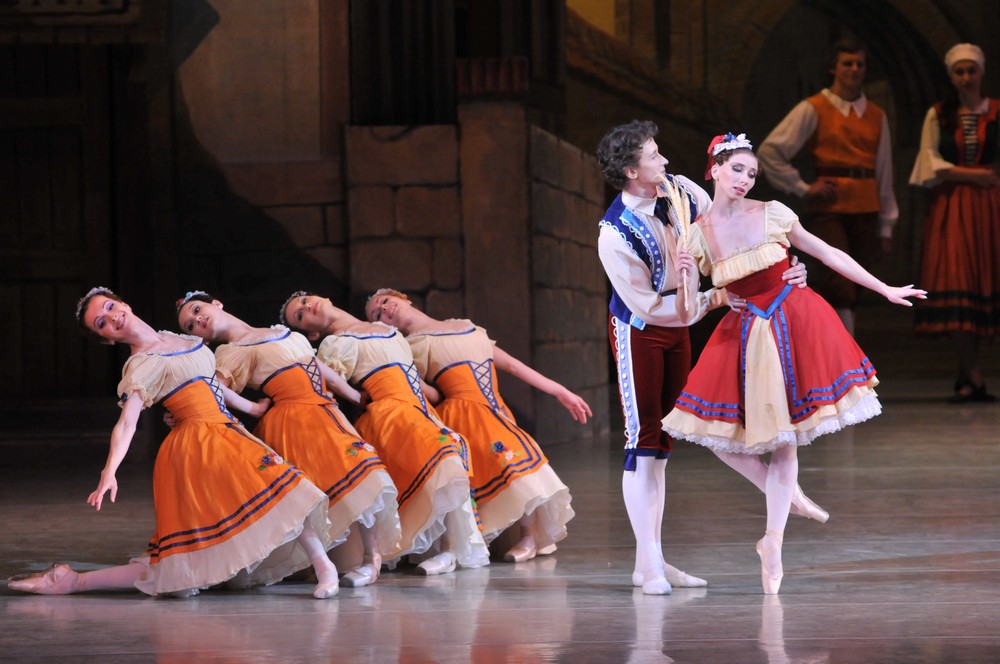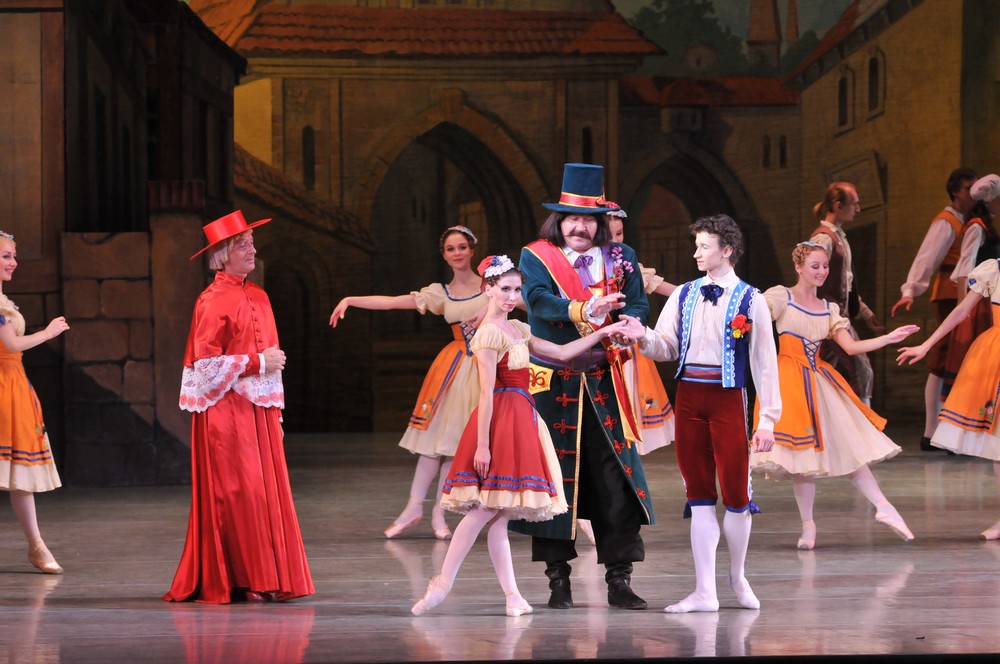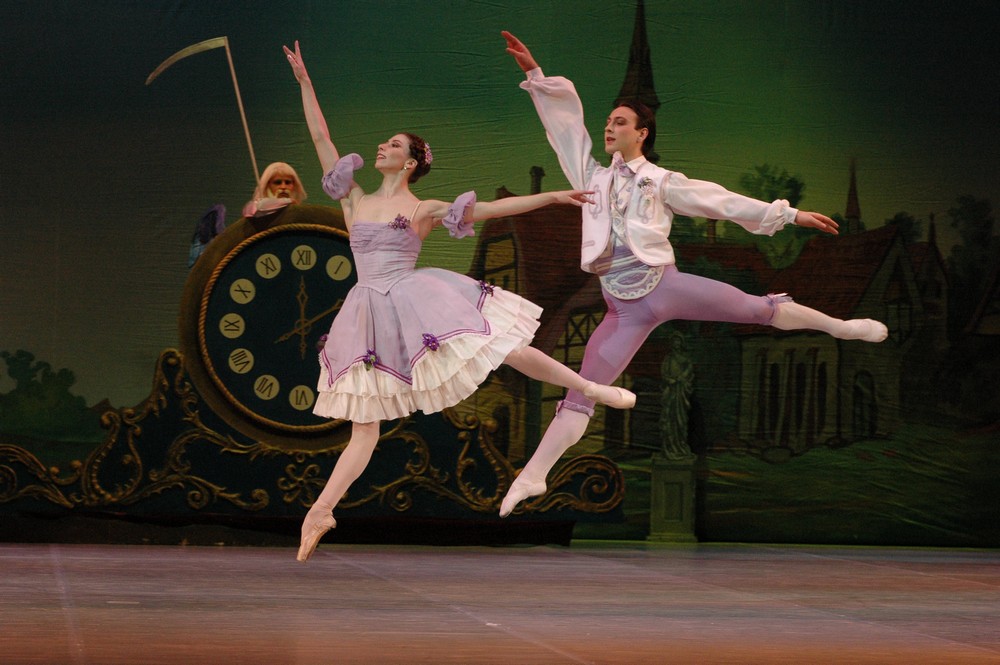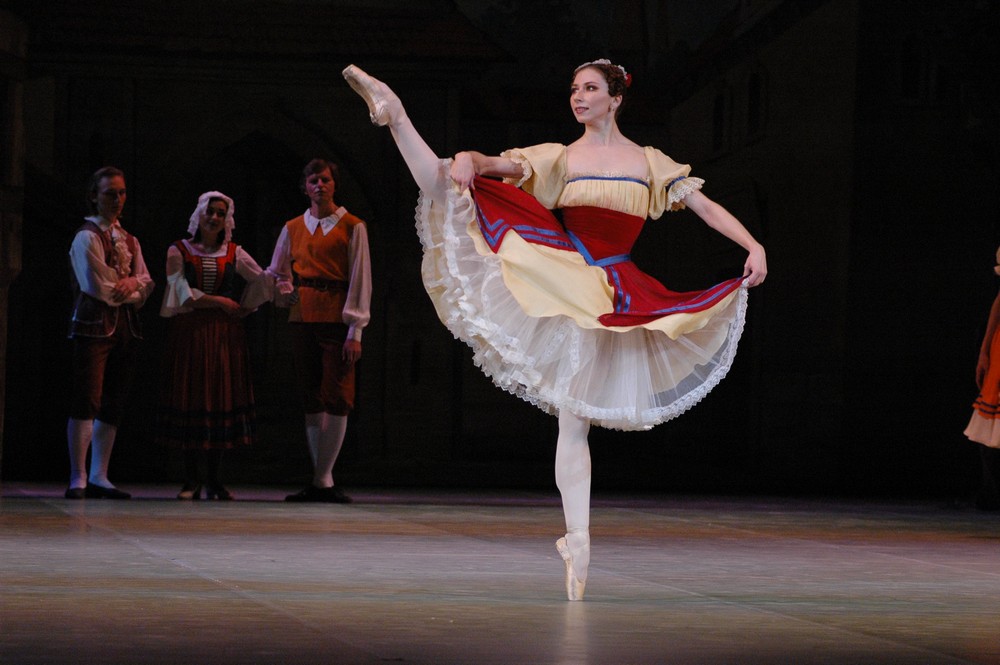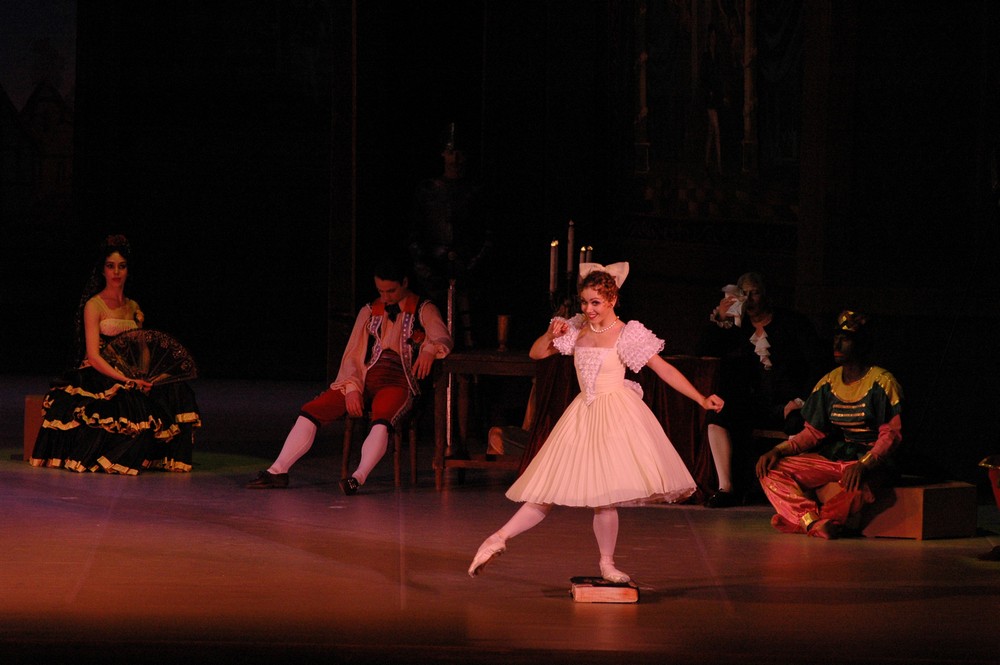hall
Artists
Credits
Libretto by Charles Nuitter and Arthur Saint-Leon
Revival of the production of the Mariinsky Theatre (1894)
Choreography: Marius Petipa (1894)
Sets: Ivan Andreyev (Act I), Heinrich Levot (Act II), Pyotr Lambin (Act III)
Costumes: Evgeny Ponomaryov
Authors of the revival:
Staging by Sergey Vikharev
Choreography has been restored on the basis of the notes by Nikolay Sergeyev, who had used Vladimir Stepanov’s system of notation, from the Harvard Theatre Collection, USA
Costume Designer: Vyacheslav Okunev
Sets and costumes were revived after the original sketches and photos from the collections of the St. Petersburg State Museum of Theatre and Music Arts and the St. Petersburg State Theatre Library.
Archive Researches: Pavel Gershenzon
Conductor: Alexander Novikov
Répétiteurs: Lidia Krupenina, Larisa Matyukhina-Vasilevskaya, Nina Furalyova

2 hours 30 minutes
two intervals
Première of the production: 24 May 2001
The production was shown on tour to Barcelona, Seville (Spain, 2002), Sintra (Portugal, 2002), Tokyo, Osaka, Sapporo (Japan, 2003), Bangkok (Thailand, 2004)
The production received the Golden Mask National Theatre Award as Best Ballet Production (2002)
Act I
A square in a small Galician town. A dormer window opens in one of the houses at the back of the square. A girl appears in the window. Looking around, she leaves the house and sneaks towards the house of the old Coppélius. She looks at the big window, behind which there is a motionless figure sitting with a book. Apparently, this is the daughter of the old Coppélius, the most mysterious inhabitant of the town. Allegedly, he is an alchemist and magician; but nobody knows exactly what he does. Every morning, one can see a girl, that the inhabitants of the town call Coppélia, absorbed in her reading. Then she disappears. The mysterious girl never goes out, nobody has ever heard her voice. But the beauty of the mysterious girl attracts young men, and they spend hours beneath her window. Some of the guy have even tried to get inside the house, but the doors are locked.
Swanilda (that’s the name of the girl, who has approached Coppélius’ house) suspects that her fiancé, Frantz, is not indifferent to the beauty of Coppélia. Is he even in love with her? Swanilda looks at her rival discontentedly, but the girl in the window is absorbed in reading and doesn’t even look at Swanilda.
Frantz appears in the square. At first he is heading towards Swanilda’s house, but suddenly pauses at a loss and turns to Coppélius’ house. Swanilda hides to observe him. Frantz bows to the girl in the window. She returns Frantz’s salute. Frantz has scarcely time to throw a kiss to Coppélia before the old Coppélius has opened his window and seems to be amused at what has been going on.
Swanilda tries to conquer her agitation. She leaves her hideaway and runs after a butterfly. Seeing his fiancée, Frantz joins her, catches the butterfly and pins it to his hat. Swanilda reproaches him for his cruelty. She says that she doesn’t love him any more. Frantz tries in vain to defend himself, but Swanilda wouldn’t listen.
A crowd of young men and girls appear in the square. The Burgomaster announces that on the next day a grand feast will take place — a new bell has been given to the town. The people crowd round the Burgomaster. The Burgomaster approaches Swanilda. He reminds her of her betrothal with Frantz. Why wouldn’t they be united tomorrow? The young girl looking spitefully at Frantz and tells a story of a straw, which reveals all secrets. Swanilda takes the straw from a bundle, breaks it before his eyes, tells him that everything is broken between them. Frantz goes away discontentedly.
Night falls. The square is empty. All is silent. Coppélius leaves his house and securely fastens the door. He heads to the nearest tavern to have a glass of the old good wine. He has not gone many steps, before he is surrounded by a crowd of young fellows; some of whom want to take him away with them. The old man goes off swearing.
Swanilda is bidding adieu to her friends, when one of them notices something glittering. It is a key, which Coppélius must have dropped. The girls decide to pay a visit to the mysterious house. They suggest that Swanilda should join them. At first Swanilda hesitates, but curiosity and jealousy make her agree. Well, the key is in the lock, the door opens. There is nobody in the square.
Frantz is seen coming up, carrying a ladder. He has determined to see what chance he has with Coppélia. She may be waiting for him. She may agree to flee from the old man that guards her. But just as Frantz is steadying the ladder against the balcony, Coppélius is returning: he understood that had lost his key and decided to return home. What is that? Is that somebody trying to get to his house?
Act II
Coppélius’ workshop at night. The light is mysterious. A large room is full of all kinds of automata: there are figures of an old man with a long gray beard, a Negro, a little Moor, a Chinaman. There are books, instruments and weapons.
Swanilda and her friends cautiously inspect the room. They draw aside the heavy curtains. There they see Coppélia seated with her book in her hand. They salute the strange girl, who remains motionless and silent. Is she asleep? But her eyes are open! Swanilda touches Coppélia’s hand and steps back — she has touched a doll! This young lady is an automaton! That’s whom Frantz sends his kisses! The girls feel free, they have nothing to fear now. They press the springs, and Coppélius’ automata start moving. Swanilda has a plan to put on the doll’s dress, and she hides behind the curtain.
Coppélius returns. He gets rid of the intruders and heads to Coppélia and examines it. He finds that no harm has been done. He breathes more freely. But what is that noise? There is another intruder in the window. It is Frantz, who decided to get into Coppélius’ house. Frantz is going toward the spot where he has seen Coppélia, when two stout hands seize him. He tries to escape, but the old man holds him tightly. The young man confesses that he wants to see the girl who he is in love with. Then Coppélius relents and offers Franz a drink. Frantz finds that the wine has a peculiar taste. Frantz tries to get near the window where he has seen Coppélia. But his legs give way, he falls heavily on the bench and is asleep. Coppélius is triumphant: now he can do what he has planned to! Coppélius gets a magic book and looks for Kabbalah spells. The he rolls Coppélia’s armchair closer to Frantz, who is still asleep.
He tries to take away Frantz’s soul to give life to the doll, which he created at the cost of sleepless nights and many experiments. Coppélia rises up, she begins her mechanical motions. One step, then another. Coppélius is overjoyed.
His work has surpassed all that human hand has ever created! While he’s overjoyed, Coppélia comes to life. Coppélia even furtively threatens him. Then she takes previous position. Her eyes are focused on him! Yes! She is looking at him! Coppélius wants to steel another sparkle of life to give it to Coppélia. She soon begins to dance slowly, and then all at once darts off so quickly that Coppélius can scarcely follow her. He puts a Spanish lace mantilla on her, and Coppélia dances a Spanish dance. She puts on a Scottish scarf and dances a jig.
She perceives the magic book on the floor and asks Coppélius what it means. She stops in front of Frantz, examines him. She grabs a sword and wants to stab the young man. Coppélius doesn’t know how to calm down the enraged Coppélia. She wants to seize the doll, but she escapes him. She jumps and runs around, throwing everything within her reach to the ground and breaking it! At last Coppélius manages to stop the doll and put it back to the pedestal.
The old man is tired and needs some rest. Frantz wakes up. He doesn’t quite understand what has happened to him. Swanilda skips out from behind the curtain, and together with Frantz they run down the staircase.
The poor old man has a vague notion that some game has been played on him. His doll is lying on the floor undressed. That’s who played Coppélia! He falls heavily in the midst of the automata which keep moving as if to mock at their master’s grief and despair.
Act III
The festive day has come. Benediction has been pronounced over the new town bell. Festive mood reigns in the streets. Frantz and Swanilda complete their mutual reconciliation. Frantz has disabused himself of his temporary infatuation and thinks no more of Coppélia. All at once there is a stir among the crowd. Coppélius comes to implore and even to demand justice; they have ridiculed him and have broken everything in his house, his masterpieces made with the greatest labor and patience, have been smashed. Who is going to pay him? Swanilda, who has just received her dowry, quickly offers it to Coppélius. But the lord of the manor stops Swanilda. She may keep her dowry. He throws a purse to him and whilst Coppélius departs with his money, he gives the signal for the festivities to begin.
The Bell-ringer heralds morning. Aurora appears followed by the wild flowers. The bell rings again! It is the Hour of Prayer. Aurora vanishes, chased by the Hours of Day. These are the working hours, and the young girls and reapers begin their work. The bell rings again! It announces a wedding. People start dancing and playing games.
